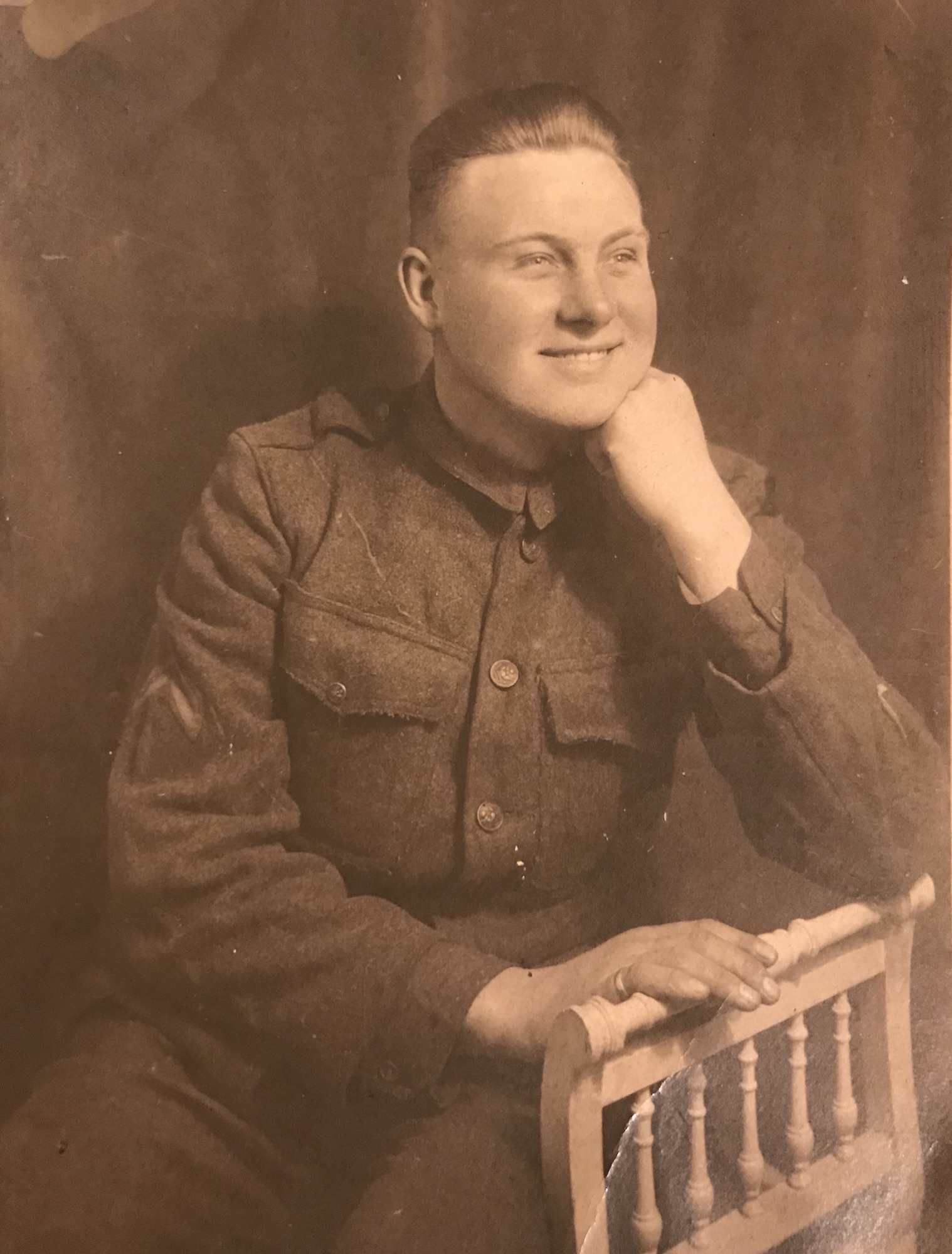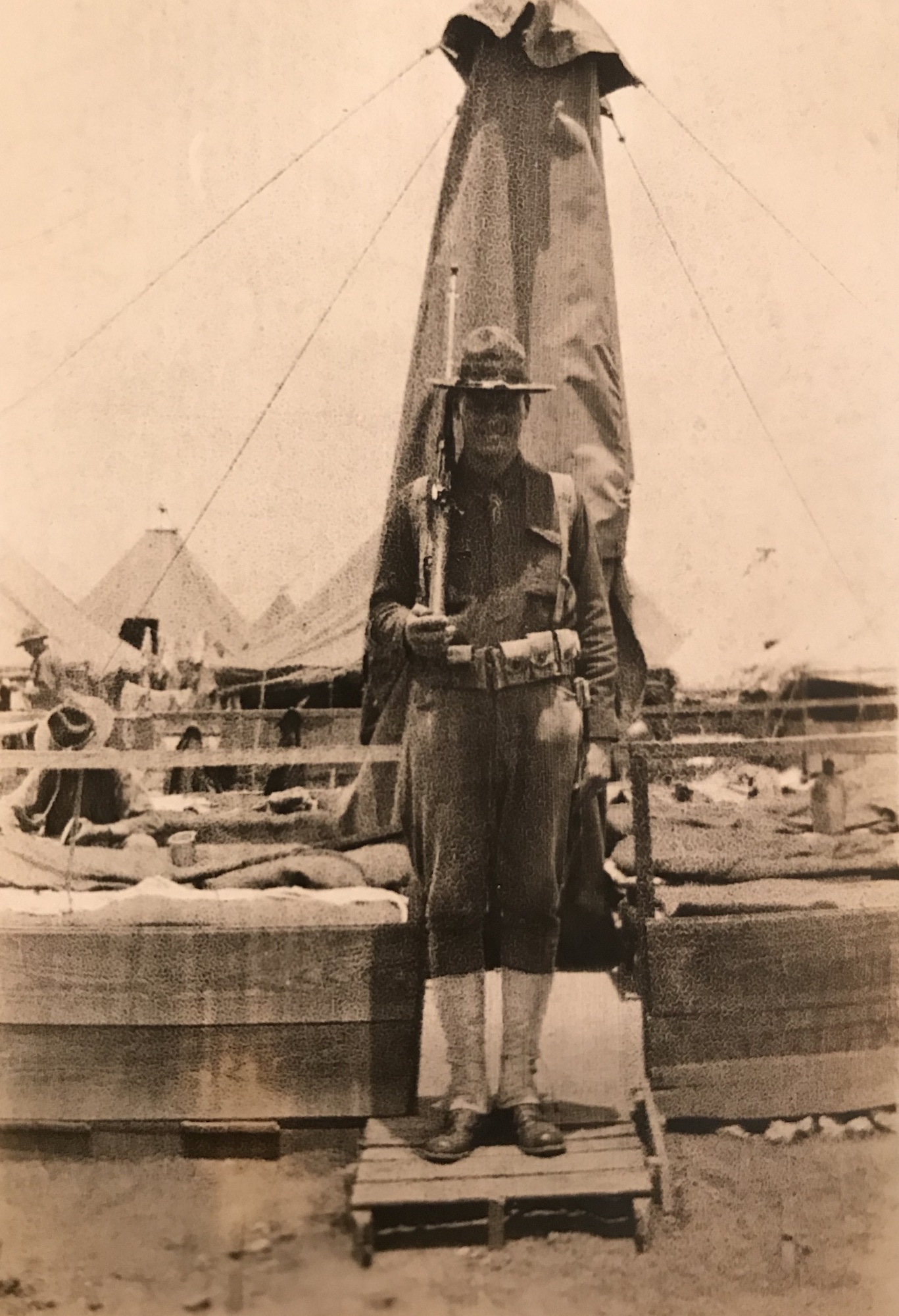In a turbulent world, today marks the 105th anniversary of the end of World War I. The wars currently in progress brought to mind a piece I wrote five ago on the Great War and what followed.
My original piece, written for the 100th anniversary of the end of Word War I on November 11, 2018, appears below.
Today marks the 100th anniversary of the armistice that ended World War I, the “Great War” meant to end all wars. My reflections below trace back the history of the war, the impact upon my family, and how we might learn from the past in a new era of uncertainty.
Historical Context
104 years ago, Serbian rebels dreaming of changed political boundaries assassinated Archduke Franz Ferdinand, heir to the Austro-Hungarian throne, in Sarajevo. The initial response was muted, but three weeks later, Austria-Hungary responded forcefully by issuing an ultimatum to Serbia essentially threatening force if it did not bring the killers to justice.
Russia and Serbia were allied and as a precautionary move against the slim chance of a Russian entrance into the dispute, Austria-Hungary sought assurances from Germany that it would provide aid should Russia declare war on Austria-Hungary.
Serbia actually did respond in a conciliatory matter to Austria-Hungary, but it failed to appease Austria-Hungary and war was declared on Serbia on July 28, 1914. Russia, bound by treaty to come to Serbia’s aid, mobilized its army. Germany responded by declaring war on Russia. France, obligated by treaty to Russia, found itself at war with Germany and Austria-Hungary. Germany invaded Belgium to clear the path for a conquering of Paris.
Britain, citing a treaty obligating it to protect Belgium, declared war on Germany. The Empire was called upon, meaning Australia, Canada, India, New Zealand, and South Africa entered the foray to fight on the side of Britain. Attempting to pioneer the seas, the Germans began submarine warfare, openly sparring with Britain and France and also threatening the commercial interests of a neutral America.
On May 7, 1915, German submarines torpedoed the British ocean liner RMS Lusitania off the coast of Ireland. Germany claimed it thought the civilian vessel was a military vessel carrying munitions. 128 Americans onboard perished and the U.S. would later use the incident as a justification to enter the conflict and declare war on Germany.
World War I would drag on till November 11, 1918, killing roughly 10 million military personnel and 7 million civilians. Over 20 million were wounded. The “war to end all wars” was hardly that – the world found itself embroiled in war again just two decades later.
100 Years Later

My grandfather, Charles Klint, was one of the “doughboys” who was drafted into service in World War I. He served bravely in France, though spent most of his tour of duty sitting knee-deep in water in the trenches of the Western Front. To be sure, the Great War was about more than trenches, but that was my grandfather’s story. And he never fully recovered from the war.
He returned to Chicago, married my grandmother, became a meat packer, and raised a family on the south side of Chicago. The affects of the war continued to haunt him. His health never fully returned and he died in 1947. My father was only seven years old at the time. How unimaginably hard that must have been.
According to baptism records and even his World War I draft card, Charles Klint was born Carl Gustaf Wilhelm Klint in 1894. His parents were immigrants from Sweden. Over the years, Gustaf was dropped and Carl Wilhelm anglicized to Charles William.
I never knew my grandfather, but my grandmother, who was born in 1898 and lived until 2006, never missed a beat in telling me what a remarkable man he was. And I don’t doubt it.

I am so thankful that my father has lived to see my grow up and hope to see my own son grow up as well. I’m also cognizant, especially as we reflect upon 100 years of armistice, that peace does come at great cost. That has become a trite line used by politicians, but how can we look at the 40 million casualties (including over 20 million deaths) that occurred during World War I and say anything else?
The “war to end all wars” became a just a naive catchphrase. War has continued to haunt humanity. It still rages today across swaths of this Earth. But rather than be crippled with despair, let us approach life in sober-minded, but determined manner. Let us appreciate the sacrifices that have been made and work diligently to safeguard the liberties which often come under attack in new forms by new actors.
I say it often, but change starts on a personal level. Traveling the world has opened my eyes to the beauty of the human family. It dispels prejudices and leads to greater understanding and appreciation that every person in this world, as an image bearer of the Creator, is worthy of dignity. We are called upon to love another and as imperfect as we may do that, it starts in the immediate space around us.
CONCLUSION
The world has changed dramatically over the last century, but in some ways nothing has changed at all. Life groans on. Let us never forget what World War I meant for the world. But let us daily resolve to seek wisdom and reconciliation over folly and division.




Yes war is madness. Vox has a great video showing the consequences of such foolishness. https://www.youtube.com/watch?v=BJzjt_aFc00&t=0s
Thank you for sharing that story, Matthew.
Your grandfather “served bravely in France, though spent most of his tour of duty sitting knee-deep in water in the trenches of the Western Front”, but yesterday the American president couldn’t be bothered to honor your grandfather’s fallen comrades at the Aisne-Marne American Cemetery outside Paris because the drizzly weather was “iffy”.
Well said Kenneth. It’s hard not to politicize stuff nowadays. I think you are right to bring it up. Bravo. And ignore the Trump scum who will be outraged.
Interesting story and perspective Matthew. Very moving to read the words about your grandfather’s and hence father’s experience with the horrors of war. Clearly brave upstanding men.
Ultimately though now we are left with a draft dodging lunatic in the highest office, disrespecting memories and about to be cornered in his tenure.
Let’s hope he doesn’t try to swing his way out of the corner by starting a war to distract. Impeach that SOB Americans, we Europeans implore you. NOW.
I’d rather he honor the living by committing to peace during his term in office. I have never understood people’s obsession with “honoring the dead” while abusing the living.
Aside from perhaps Serbia, WWI was not about freedom. Albeit, it spawned revolutions WITHIN certain countries.
Matthew, I think you’ve now substituted “peace” for “freedom.” However, I think it would be even more accurate to substitute “war” for “peace,” and drop the first part of the following sentence.
Your point is well-noted, but I’ll leave it now. I changed freedom to peace because I did not want anyone to be confused about my intention. In that sentence I was taking a broader look at war, but indeed it sounded like WWI was fought for freedom. Sadly, that was not really the case, making the war even more frustrating even 100 years later.
This was the most ludicrous of all wars; fought for no good reason and it was a strong indirect cause of WW2.
The experience of your grandfather is not unusual; across the world the returnees became known as a silent if not sullen generation, reflecting the horror of their experience. What’s most appalling though is that so many of them lost their jobs during the depression and couldn’t find work again until the outbreak of WW2 , becoming the forgotten men ( “Remembering my forgotten man” from Gold Diggers of 1933″).
Well said, Matthew. For anyone who is truly interested in the chain of almost unbelievably silky and unfortunate events that led to the First World War (and indeed eventually to the Second World War as they are intimately related) please read “The Guns of August” by Barbara W. Tuchman, which remains a key text for anyone who wants to understand international politics today.
Let’s take a moment to give thanks to all those soldiers who gave their lives, especially in the First World War, one century on, give us the international society we enjoy today.
My Grandfather may have been his cook in France.
He was an immigrant from Poland and joined the army as a private in WWI. He spent his time in France as a cook before returning home and eventually opening a restaurant in Queens. Later he ran a laundry there and used all of his savings to slowly bring his relatives over from Europe, one by one.
So you’re of Swedish extraction!
On my paternal grandfather’s side. German, Norwegian, and English on the other three sides. Quite a mix!
I claimed Italian citizenship by descent in 2013 and, despite being born an American, I am extremely proud to now be a citizen of the European Union and contribute to the greatest peace project in the history of the world.
> Germany claimed it thought the civilian vessel was a military vessel carrying munitions
The Lusitania *was* carrying munitions when sunk, including over 4 million rifle rounds. (Great book on this event by Erik Larson.)
There has never been any doubt that the Lusitania was carrying weapons/munitions. The final manifest lists the aforementioned rifles and additionally the 1500 cases of shrapnel shells, pyroxyline and other items falsely labeled as butter ,etc.
The British continued to lie about it for decades in the (largely successful) hope of getting sympathy/ anti-German outrage.
An absurd war in which all the participants lost. Pyrrhic indeed.
Slow clap, lenin1991. So you think the murder of civilians was justified?
Ask Israel.
Answering on behalf of Israel – attacking the enemy is ok by the laws of war. A ship carrying ammo is a military target.
Any other position makes civilians an invincible shield. Military leaders would use this shield.
By sending ammo to UK, the US took a side in WW1. The right side.
Appears the Brits used the passengers of the Lusitania as human shields. However since it was carrying munitions for the war effort it was fair game no matter how tragic the outcome. And I understand the Germans did issue warnings to that effect.
I was in Sarajevo two weeks ago and visited the place where the assassination took place. Such a tiny corner near the downtown, and what a big war emerged from that place…thanks a lot for sharing this, Matt!
Fascinating to read about your family Matthew. So well said.
Thank you, Matthew. Beautiful article and a tribute to what for many is a forgotten war. I was born 75 years ago today, exactly 30 years to the day after the armistice was signed. I’m one of those veterans who didn’t get much of a welcome home from serving during another war but am so pleased our service is now being recognized. Articles like yours make sure those who wore the uniform are never forgotten.
John I thank you, and everyone who has served our country. You are all my heroes.
And happy birthday.
Indeed. Happy birthday John and thank you for your service.
This is why expansion of NATO is lunacy. UK or Belgium defended, ok, even new member Finland. However, admitting Albania or Bulgaria was a huge mistake. Want to die for them or start World War 3 for them?
NATO cheats America because Hawaii is not protected by NATO. Neither is Guam.
The expansion of NATO is useful for peace dividends, but the question really does come down to whether there really is an additional peace dividend to be had by being tied up with and providing a security umbrella to a country with different values and whose leadership can decide to be unnecessarily provocative toward a third country and cause problems for or even within the NATO alliance when it can count on a big security umbrella. But we already have a history with Turkey. And Hungary is in too. And Poland and the Baltics sometimes seem like the little dog with a too big bark for the size. But it’s smaller and weaker states being targeted first for attack by “an enemy state” that escalates the risk of conflagration and expansion of conflict across additional geographies and in additional ways, and so those little but loud dog barkers can be a good ally and alert partner for regional and global security management purposes.
NATO should have dissolved at the same time that the Warsaw Pact disbanded. If that happened I don’t think we would be having the mess that is happening in the Ukraine.
Given that Putin is not unique within Russia of wanting to see the US humiliated as payback for what they perceived as a humiliating collapse of the Soviet Union and what followed for Russians, I think he or some Russians like him would aim to try to reconstitute what they felt they lost even if NATO were to have been disbanded; and thus they would still behave aggressively and in expansionist ways.
NATO has its issues but it has worked pretty well to limit direct confrontation and the scope of the de facto proxy fighting between the US/NATO and Russia.
More evidence that you are nothing more than a Russian plant. How is expanding NATO lunacy? You obviously don’t understand the purpose of NATO, the strategic location of its’ allies, and unfortunately do not have the intelligence to process it.
Just another comment to show the world your ignorance, and remind the world there’s a lot of stupid Americans.
Interesting story. Were his parents from Smalland or Skane in Sweden? A very large part of the Swedish migration to NY and/or the Midwest c. 20-35 years before his birth was from that part of Sweden. Given how particular Swedes and the Church of Sweden have been with population registers, you should be able to rather easily find out their origins in the country.
The experience of German immigrants and German Americans in the Upper Midwest during World War 1 was rather different than for the Swedes in the area.
About 20 years ago I ran into the following guy still sort of smarting about the lack of remembeance for the large number of Indian casualties during World War 1:
https://www.bbc.com/news/magazine-33317368.amp
The outcome of WW1, or more precisely the isane penalties imposed onto Germany in the treaty of Versailles was the main reason for WW2. To this day, many people think that Germany started WW1 which is not true – they entered the war similarly to other large nations like Britain and France, only because they were bound by treaties. In fact, the Kaiser at the time tried to avoid being sucked into the war. But of course the winners tell a different story.
WW2 was different of course, it was started by Germany AND Russia who simultaneously invaded Poland. But without the insane penalties from WW1, there never would have been a WW2.
WW III up next. Humans will always have Wars. ‘Can’t we all just get along.’
The USA should never have intervened in World War I. The intervention of the USA in World War I went against George Washington’s admonition in his Farewell Address where he cautioned against getting involved in entangling overseas military alliances (especially in Europe). Since World War II the USA has morphed into a de facto Empire. That ought not to be.